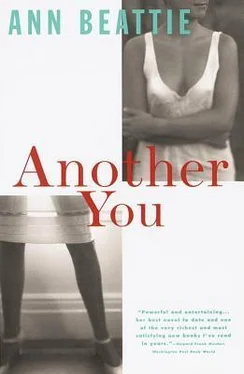Ann Beattie - Another You
Здесь есть возможность читать онлайн «Ann Beattie - Another You» весь текст электронной книги совершенно бесплатно (целиком полную версию без сокращений). В некоторых случаях можно слушать аудио, скачать через торрент в формате fb2 и присутствует краткое содержание. Год выпуска: 2014, Издательство: Vintage Books, Жанр: Современная проза, на английском языке. Описание произведения, (предисловие) а так же отзывы посетителей доступны на портале библиотеки ЛибКат.
- Название:Another You
- Автор:
- Издательство:Vintage Books
- Жанр:
- Год:2014
- ISBN:нет данных
- Рейтинг книги:5 / 5. Голосов: 1
-
Избранное:Добавить в избранное
- Отзывы:
-
Ваша оценка:
- 100
- 1
- 2
- 3
- 4
- 5
Another You: краткое содержание, описание и аннотация
Предлагаем к чтению аннотацию, описание, краткое содержание или предисловие (зависит от того, что написал сам автор книги «Another You»). Если вы не нашли необходимую информацию о книге — напишите в комментариях, мы постараемся отыскать её.
Another You — читать онлайн бесплатно полную книгу (весь текст) целиком
Ниже представлен текст книги, разбитый по страницам. Система сохранения места последней прочитанной страницы, позволяет с удобством читать онлайн бесплатно книгу «Another You», без необходимости каждый раз заново искать на чём Вы остановились. Поставьте закладку, и сможете в любой момент перейти на страницу, на которой закончили чтение.
Интервал:
Закладка:
“Whew,” she said. “That’s a slight departure from what we were talking about.”
“You’re a doctor,” he said. “If they take out a spleen — they can remove a spleen without its being a big deal, right?”
“It isn’t a good sign that when they’ve operated and things have stabilized, there’s sudden internal bleeding.”
“I wouldn’t imagine,” he said.
“I hope we find out he’s all right soon,” she said. She looked at her watch. “My son’s picking me up in another five minutes.”
“You have a son who drives?”
“Learner’s permit. You can get them at sixteen. His father’s giving him a lesson.”
“They dropped you off?”
“I don’t live with my husband. I took a bus, but my son and his father are going to pick me up and drop us at home.”
“Ah,” he said.
“He turned sixteen a week and a half ago, and already he’s volunteering to pick me up because he knows he can hit his father up for the car, and his father will feel like he’s doing a good deed to let him drive, then deposit us both safely at home.”
“That’s nice of him,” he said.
“My husband and I divorced because he was an alcoholic, but for the last three years he has been sober, married to another woman who has given birth to two of their children, and he’s very, very sorry and wants me back.”
He stared at her. Such complexity, everywhere. For what seemed an eternity, he had been sitting in an orange plastic chair, talking to a pretty young woman who sat on the corner of a sofa covered in material that looked as if a cat-clawing contest had been held atop it. Some doctor, some nurse, must have brought the sofa from home — the sofa with the clawed arms, the nearly threadbare material, a bulge of foam rubber from the far cushion, one leg propped up — he now saw — with a cinder block, in place of a gold-tipped peg leg.
“That sounds peculiar?” she said.
“Not that so much — the sofa. You’re sitting on a deteriorating sofa that looks like it’s been used after hours for a cat fight.”
“McCallum used to miss his own sofa,” she said. “His son is hyperactive, and he jumped one too many times, and he wouldn’t replace it. He put the old sofa with the broken frame by the curb for the garbage pickup, and then there were just the uncomfortable ladder-back chairs.”
“It’s a lot to have to deal with,” he said. Which, to his mind, meant all of it: the hand you were dealt, fate, unpredictable meetings in anonymous buildings, even. The alcoholic who reformed too late. The sofa frame not built to withstand repeated impact.
He was so agitated that he did not expect the doctor to be walking toward them, up to the last second, when he looked up and understood that they, alone, were the focus of the man’s attention. He asked if Jenny Oughton was McCallum’s wife. Didn’t he realize why McCallum was a patient? You always heard that doctors and nurses did nothing but gossip — could this doctor have no idea of the particular circumstances surrounding McCallum’s admission? Or could he have thought McCallum’s wife was out on bail, cooling her heels until her husband got out of surgery?
Jenny Oughton said she was not; she was a friend. Marshall said the same thing, because, again, it did not seem the right time to qualify anything.
The doctor told them the surgery had gone well. McCallum was in the recovery room, the internal bleeding stopped. He seemed to be searching their faces to see if he needed to elaborate. Then, in their muteness, he must have decided he could walk away. Marshall had risen, Jenny had not. Still, the doctor seemed more focussed on her, shaking Marshall’s hand as he looked through him. The guy’s just tired , Marshall thought. What havoc McCallum’s wife had caused. What misery and pain.
“Well,” Marshall sighed, sinking down onto the chair again as the doctor left. “Who would have thought we’d cross paths once when I walked in on a book discussion group, and the next time in the hospital? Did whatever you were discussing that night clarify anything about this?” He was mocking himself, repeating one of Gordon’s annoying assumptions: that books did not pertain to real life.
“That was probably in October, wasn’t it?” Jenny Oughton said. “As I recall, we were discussing The Scarlet Letter .”
He shook his head. Only fair that his inner-directed sarcasm had been mistaken for serious thought. This woman did not seem frivolous. She probably heard very few tossed-off comments during the course of any day.
“It was interesting that a lot of us who thought we remembered the book had forgotten the husband,” she said. “We remembered her punishment by the community, but not by Chillingworth. It must have been wonderful to be able to give characters names like that. No writer could get away with that now.”
She’d caught his interest. “What were you discussing about Chillingworth?” he said.
“That he returned to haunt her, and it turned out we’d all forgotten. I guess you grow up and you want to forget there can be real bogeymen. And the way Hawthorne presented him, he was so … well, chilling. Old and ugly. Absent. He’d wanted her youth and then deserted her, really. That’s not terribly different from what Susan McCallum was protesting, I suppose. In the book, your sympathy is all for the one who’s been abandoned: Hester Prynne. It’s not as easy to see what the transgression was with McCallum, obviously. And he isn’t old and ugly. He’s actually quite attractive. But she thought he’d withdrawn, and then when he reacted the way he did about her pregnancy, I suppose Susan thought everything was going to be worse. I’m not sanctioning stabbing him. I’m just saying that when you don’t see the thing that’s stalking someone, often you forget to factor it in. But that thing can be as real as a person.”
Was she talking personally? Not only about The Scarlet Letter , not only about the McCallums?
“Forgive me,” she said, “I’m overstepping my bounds. This is conjecture. Not something I have any understanding of from both perspectives.”
“But I thought he’d been your patient,” Marshall said.
“He hadn’t been there to talk about his home situation,” Jenny Oughton said. “When something like this happens, you feel you’ve miscalculated, though. It does make you wonder whether you should let things evolve, let the client get around to what’s really the problem, or be more directive. I’ve really said too much. It’s not always easy to keep everything compartmentalized.”
He liked her much better, suddenly, and was sorry she was getting up to leave. He helped her on with her coat, wrote a quick note to McCallum, which they both signed, saying they’d waited for him to get out of surgery (as if they’d known it was going to happen), that each would visit soon. They walked together to the nurses’ station and asked the only nurse willing to make eye contact to give the note to McCallum when he returned.
In the elevator, the piped-in Muzak was playing a slowed-down version of “Age of Aquarius.” Everyone looked straight ahead, lost in thought as the elevator stopped at almost every floor, slowly proceeding to ground level.
“You’re sure your son is coming,” he said.
“As sure as I can be of anything,” she said. “It was nice to see you again.”
He shook her hand. She had pulled on purple suede gloves with linings so thick he couldn’t feel the hand inside. He felt slight frustration at not being able to register the handshake, at her retreat into the formality of her goodbye. Walking to the parking lot, he thought about partings: McCallum’s odd two-fingered wave; Cheryl Lanier’s attempt at a grown-up sign-off at the end of her letter (“Goodbye, and take care”) that had seemed, instead of exhibiting maturity, to signal her youth with its slightly portentous formal good wishes. And his mother? How had she left the room that night so long ago? Certainly she hadn’t waved, but how had she departed, since she couldn’t have evaporated into air? One of the most upsetting things about having remembered that night was that the more he tried to remember, the more everything seemed to recede.
Читать дальшеИнтервал:
Закладка:
Похожие книги на «Another You»
Представляем Вашему вниманию похожие книги на «Another You» списком для выбора. Мы отобрали схожую по названию и смыслу литературу в надежде предоставить читателям больше вариантов отыскать новые, интересные, ещё непрочитанные произведения.
Обсуждение, отзывы о книге «Another You» и просто собственные мнения читателей. Оставьте ваши комментарии, напишите, что Вы думаете о произведении, его смысле или главных героях. Укажите что конкретно понравилось, а что нет, и почему Вы так считаете.












